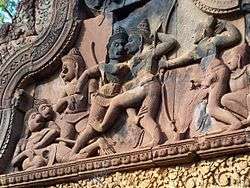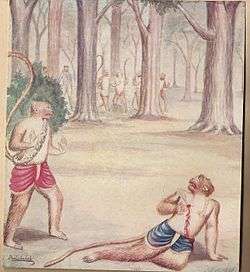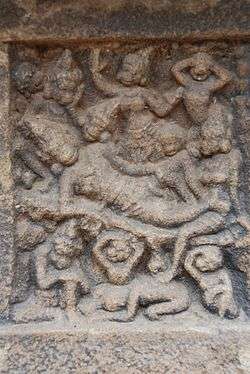Vali (Ramayana)
| Vali | |
|---|---|
| Ramayana character | |
 Vali, the Monkey King killed by Rama | |
| Information | |
| Title | Maharaja |
| Family | Indra (Father) and Vanara (Race) |
| Spouse(s) | Tara |
| Nationality | Kishkindha |
In the Hindu epic Ramayana, vanara Vali was king of Kishkindha, husband of Taara, son of Indra, biological son of Vriksharaja and Elder brother of Sugriva and father of Angada. He was killed by Lord Rama, an Avatar of Lord Vishnu. Vali was also invincible during Thretha Yuga. Vali also defeated some of the greatest warriors like Ravana and Meghanada. Even Lord Rama & Lord Hanuman couldn't fight against Vali.
In Hare Krishna belief-system, Vali was reincarnated as Jara (the hunter) who killed Krishna with an arrow tipped with a shard of iron from a club borne by Samba (Krishna's son by Jambavati).
Vali (Sanskrit: वाली, nominative singular of the root वालिन् (Valin) is also known as Bali in several Indian languages. His other names include:
Indonesian: Subali
Malay: Balya
Lanna: Bari
Thai: Phali
Lao: Palichan.
Birth
One day, Vriksharaja was on his way to take bath in a water source nearby. After having bath, he came out of it. He was astonished to see his body turned into female form. Soon he turned into beautiful lady. At the same time, Indra & Surya (Sun-god) were on the way to heaven after visiting Brahma. Suddenly their vision got diverted to Vriksharaja (in female form). As a result of which Vali was born as Indra’s son & Sugriva was born as Surya’s son. Both the gods visited Vriksharaja & blessed him that his sons would emerge as prominent heroes in Ramayana. Especially Vali would become invincible. Later Vriksharaja turned back into his normal form. [1]
Early life
Vali was husband of Tara. As one myth goes, fourteen types of gems or treasures were produced from the churning of ocean. One gem is that various Apsaras (divine nymphs) were produced and Tara was an Apsara produced from the churning of ocean. Vali who was with the devas, helping them in the churning of ocean, took Tara and married her.
Vali was very courageous this can be understood from the fact that, when Tara tried to stop him and begged him to not to go to fight Sugriva, by saying that it is Lord Rama who is helping Sugriva and has come to Sugriva's rescue; Vali replied to Tara that even if he is fighting against God he can't ignore a challenge for a fight and remain quiet. He adds that even if the caller for the fight had been his own son Angada, he would still go to fight.
Vali's boon
Vali obtained a boon from Lord Brahma. Vali sat in penance for Lord Brahma & Brahma was pleased with Vali's penance. Vali asked Brahma to give a boon such that 'In any duel with Vali, Vali's opponent loses his half strength to Vali'. Brahma granted the boon happily. Already Vali was extremely powerful with his power almost equal to 70,000 elephants. Thus Vali became invincible. It is said that no one could defeat Vali in the war.
War with Ravana
Ravana comes to know about Vali & his strengths through Narada. Hearing Narada praising Vali, Ravana became extremely arrogant & reached Kishkinda. There Vali was in meditation. Ravana challenged Vali to come & fight. First Sugriva fought with Ravana & got defeated. Ravana then reached Vali & challenged him. Vali & Ravana then waged a rough war. Vali defeated Ravana & tied Ravana with his tail. Vali then arrested Ravana. Vali started carrying Ravana on his shoulders. Ravana couldn't bear the insult & asked Vali for the friendship. Immediately Vali released Ravana - thus proving that Vali was greatest & most powerful person on the Earth at the time of Tretha Yuga.[2]
Rama Meets Sugriva
Wandering in the forest with his brother Laxman in search of his wife Sita - kidnapped by the rakshasa king Ravana, Rama meets rakshasa Kabandha and kills him, freeing him from a curse. The freed Kabandha advises Rama to seek the help of Sugriva to find Sita.
Continuing on his journey, Rama meets Hanuman and is impressed by his intelligence and skills as an orator. This also boosts Rama's confidence in Sugriva. Sugriva tells him the story of how Vali became his enemy. In Sugriva's version, he is entirely innocent and Rama believes him.
Sugriva is very scared of Vali and he is full of doubts that Rama could kill him. He tells him many incredible stories of Vali's power. As proof, he shows Rama a hole in a saal tree which Vali had made in one shot. When it is Rama's turn, he penetrates 7 trees of saal in a row with 1 arrow. After going through the trees, the arrow even makes a strike on a huge rock and splits it into pieces. Sugriva is happy and says, "O Rama, you are great."
Rama asks Sugriva to challenge Vali and bring him outside Kishkindha. As Rama explains later, for 14 years he cannot enter a city. Moreover, Rama does not want any unnecessary bloodbath of Vali's army with whom he wants to maintain friendly relations. Despite this, killing Vali would not be impossible for Rama as Sugriva and Vali were identical twins. Just a few days before, Rama had killed Khar and Dushan and their army of 14,000 rakshasas.
Sugriva formed an alliance with Rama. Rama had been travelling the length of India in search of his kidnapped wife, Sita. Sugriva asked Rama's help in return for his help in defeating Ravana and rescuing Sita. The two hatched a plan to topple Vali from the throne.


Sugriva challenged Vali to a fight. When Vali sallied forth to meet the challenge, Rama emerged from the forest to shoot and kill him with an arrow from the back of a tree.
A dying Vali told Rama, "If you are searching for your wife you should have come to me for help and friendship. Whoever took Sita, be it Ravana himself, I would have defeated them and would have brought them to your feet, to your mercy."
Vali asked the following questions:
- He made my wife a widow and stole my kingdom. What was my crime?
- Even if I committed a crime (with my brother), what is your right to kill me? I would have helped you in getting Sita, your father King Dasharatha helped my father King Indra to fight against rakshasas.
Rama makes the following replies to Vali:
- The younger brother should be treated like a son. Even if he made a mistake you should forgive him, especially when he promised to respect you for your whole life.
- About his authority, he said he had permission from King Bharata to spread righteousness and punish evils. You lost your kingdom while fighting with mayavi and you are no more a king, so how can I ask you for your help?

After Vali's Death
After death of Vali, Sugriva recaptures his kingdom and regains his wife Ruma. Angada, son of Vali and his wife Tara, is made Yuvraja, or the crown prince.
Rama's slaying of Vali had a special significance. At the beginning, Vali argued with Lord Rama, why he had to kill him in a cowardly way. Rama explained to him about the various purusharthas and showed him his Vishvarupa and how everything was pre-ordained according to the Kala-chakra and granted him moksha. Vali was then convinced and also asked his son Angada to stand by his uncle Sugriva and assist in the divine work of Lord Rama.
It is also said by ISKCON that Rama promised Vali to give him a chance to avenge his unjust murder. Vali was reincarnated as a hunter and archer Jara in Mahabharata (Dwapar Yug). Jara was the cause of the death of Shri Krishna (the reincarnation of Shri Rama) when he struck his feet by an arrow taking them to be a deer.
Vali's son, Angada, joined Lord Shri Rama's army and was given important responsibilities in Rama's war against Ravana.
References
External links
- Mahabharata, Book III: Vana Parva, Section 278: online text for the section of the Mahabharata describing Rama's alliance with Sugriva and the killing of Vali.
- Ramayana, Book IV, Canto 16: online text for the section of the Ramayana of Valmiki describing Bali's death at the hands of Rama.
- Photographs of a bas relief at the temple of Banteay Srei in Cambodia depicting the combat between Vali and Sugriva.
- Valmiki Ramayana Kishkindha Kanda Prose Sagara 11

.jpg)
